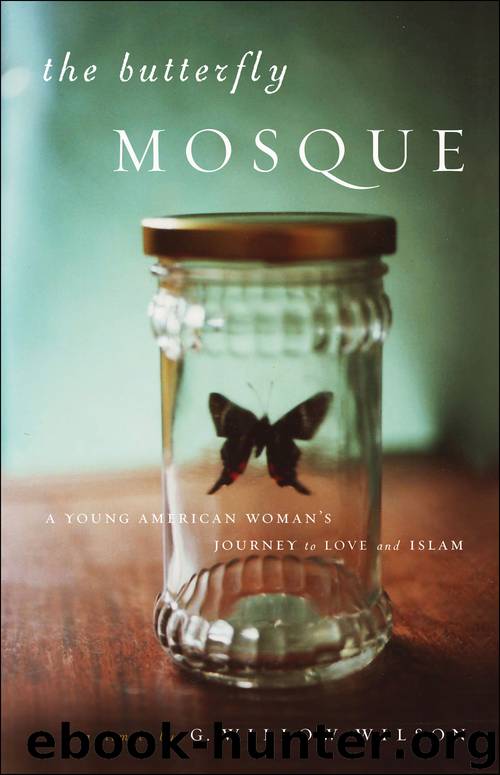The Butterfly Mosque by G. Willow Wilson

Author:G. Willow Wilson
Language: eng
Format: epub
Publisher: Grove/Atlantic, Inc.
Published: 2010-01-28T16:00:00+00:00
Arabic Lessons
Al qitu cat’u, al far rat’u, al nahr river’u.
—early twentieth-century Arabic-English teaching song
AS MY CONFIDENCE INCREASED, I BEGAN TO ASK FOR THE things I needed and to find ways to make myself more independent. First among these was to get formal training in the colloquial Arabic I had been picking up haphazardly from sources like Mohammad and Namir. I began taking lessons with a tutor named Sameh twice a week at a language center in Maadi. It’s ironic, or maybe appropriate, that one of the people who most helped me to thrive in Egypt was not only a man but a Christian.
Sameh would be my Arabic teacher for almost two years. Perhaps because he, too, was part of a minority in Egypt, he understood the mechanics of the place the way a minority or an outsider must. This didn’t seem to dampen his enthusiasm for his country. Sameh, like Omar and the friends and family members I admired most, seemed to have his eyes trained permanently on the horizon, as if he could will it closer. It’s a kind of idealism I have seen only in this part of the world, where there is urgency to all rebirth and reform, because everyone is aware that this very moment is the last and best chance to save a faltering civilization. Omar and Sameh, each in their own ways, were architects of a Middle East that does not quite exist yet, but in which determined people could already begin to live. No one willing to participate in it would be a foreigner, and so Sameh insisted that I learn not to speak like one. The first afternoon I came into his classroom, I think I wanted to show off; while chatting with the student who had the lesson before mine, I doodled a sentence in Arabic on the board. When Sameh came in he paused for a moment to read it.
“Did you write this?” he asked. I said that I had. Without speaking, he carefully erased my diacritical marks and drew in the correct ones, then smiled in a way that suggested he had forgiven me this time but in the future would find such precociousness annoying. The tone of our lessons was set.
One evening, he asked me a strange question.
“Why did you come to Egypt?”
I looked up, surprised. Sameh had one hand under his chin, and the delicate blue colored tattoo of a cross that distinguished him as a Copt was visible on the inside of his wrist. The space of the table was between us: we never sat or stood side by side, and never ever touched, not even to shake hands. The garden door was open, even in the dead of winter; these were the things that we did to make our lessons proper. For a man and a woman who are unmarried to be alone together in private is a violation of Shari’a law; that tension is increased by social stigma when the man is a Christian and the woman is a Muslim.
Download
This site does not store any files on its server. We only index and link to content provided by other sites. Please contact the content providers to delete copyright contents if any and email us, we'll remove relevant links or contents immediately.
| Military | Political |
| Presidents & Heads of State | Religious |
| Rich & Famous | Royalty |
| Social Activists |
Waking Up in Heaven: A True Story of Brokenness, Heaven, and Life Again by McVea Crystal & Tresniowski Alex(37812)
Empire of the Sikhs by Patwant Singh(23086)
We're Going to Need More Wine by Gabrielle Union(19046)
Hans Sturm: A Soldier's Odyssey on the Eastern Front by Gordon Williamson(18592)
Leonardo da Vinci by Walter Isaacson(13337)
The Radium Girls by Kate Moore(12030)
Tools of Titans by Timothy Ferriss(8398)
Educated by Tara Westover(8054)
How to Be a Bawse: A Guide to Conquering Life by Lilly Singh(7486)
Permanent Record by Edward Snowden(5848)
The Last Black Unicorn by Tiffany Haddish(5639)
The Rise and Fall of Senator Joe McCarthy by James Cross Giblin(5281)
Promise Me, Dad by Joe Biden(5154)
The Wind in My Hair by Masih Alinejad(5095)
A Higher Loyalty: Truth, Lies, and Leadership by James Comey(4964)
The Crown by Robert Lacey(4817)
The Iron Duke by The Iron Duke(4358)
Joan of Arc by Mary Gordon(4115)
Stalin by Stephen Kotkin(3969)
